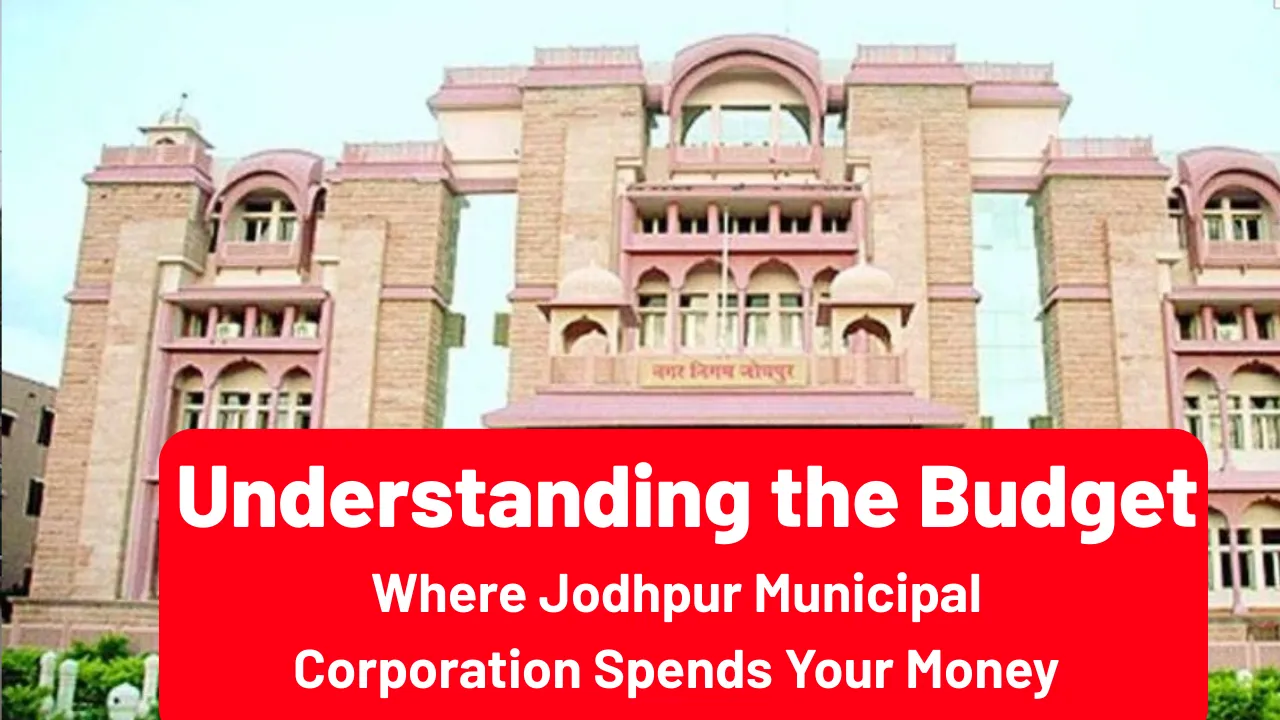Understanding the budget is the first step toward becoming an informed citizen. In Jodhpur, every rupee collected through taxes, fees, and grants is assigned to specific purposes that directly affect the city’s growth and your daily life. While the numbers might seem complicated at first, they represent the choices your municipal leaders make to maintain and improve the city.
This article offers a clear look at where the Jodhpur Municipal Corporation (JMC) spends its money, breaking down the major expense categories, income sources, and priorities. You will also learn how to track budget updates and how your involvement can influence better decisions for the community.
Understanding the Budget and Its Local Impact
When it comes to understanding the budget in a local context, the process is more than balancing income and expenses. For Jodhpur Municipal Corporation, the budget is a roadmap that outlines which city services get priority, how infrastructure will develop, and where public funds will be invested for the year ahead. A well-planned civic budget directly impacts quality of life — from cleaner streets and reliable water supply to better healthcare facilities and safer roads. For citizens, this knowledge builds trust, encourages transparency, and allows meaningful participation in local governance.
Overview of Jodhpur Municipal Corporation Budget
The JMC budget is an annual financial plan that covers projected revenue and planned expenditures. Revenue comes from multiple sources such as property tax, service charges, and government assistance. These funds are distributed to areas like infrastructure development, waste management, public health, and community welfare.
This process ensures that the city has a structured approach to addressing both immediate needs and long-term growth. A transparent budget not only provides a spending guide but also helps in measuring the success of projects and identifying areas that require improvement.
Key Sources of Income
For Jodhpur Municipal Corporation to function, it needs steady income. The main sources include:
- Property Tax – The largest revenue stream, collected from residential and commercial properties.
- Business Licenses and Fees – Paid by traders and businesses for operational permissions.
- Government Grants – Allocations from state and central governments to support civic projects.
- User Charges – Fees for services like water supply, sewer connections, and garbage collection.
- Advertising Revenue – Earnings from outdoor advertisements and use of public spaces.
These income channels make it possible for the municipal body to finance development work, pay staff, and maintain essential city services.
Major Spending Areas
JMC’s expenses are divided into specific areas to ensure targeted improvement across the city:
a. Infrastructure Development
Significant funds are dedicated to roads, bridges, flyovers, and lighting. This improves mobility, boosts tourism, and encourages local business growth.
b. Sanitation and Waste Management
Investment in garbage collection, street cleaning, waste segregation, and landfill management ensures cleaner neighborhoods and better public health.
c. Water Supply and Sewerage
Upgrading pipelines, installing water treatment plants, and maintaining drainage systems provide residents with clean water and reduce flooding risks.
d. Health Services
Municipal hospitals, vaccination drives, and emergency healthcare facilities receive regular funding to improve accessibility and quality of medical services.
e. Education and Community Services
Municipal schools, libraries, and training centers benefit from budget allocations that promote literacy, skill development, and community welfare.
Two Key Budget Priorities
- Cleanliness and Environment Protection – Funds for planting trees, improving parks, and enhancing recycling efforts.
- Road and Traffic Management – Repairing damaged roads, upgrading traffic signals, and introducing road safety projects.
Challenges in Budget Allocation
Budgeting for a city is not without hurdles. JMC faces constraints such as delayed revenue collection, fluctuating grants, and unforeseen emergencies like heavy rains or public health crises. Sometimes, funds must be reallocated to urgent needs, delaying other planned projects.
Balancing these demands requires careful planning, efficient tax collection, and timely execution of projects. Public oversight can help minimize wasteful spending and improve accountability.
How Citizens Can Stay Informed
Every year, JMC publishes its budget reports in public notices and on its website. Citizens can also attend council meetings to hear discussions firsthand. Local newspapers and community groups often share simplified summaries of budget allocations.
When residents stay informed, they can provide constructive feedback, support important projects, and ensure public funds are used responsibly. Active participation builds a stronger, more connected community.
FAQs
Q1: What does the JMC budget mainly cover?
It covers infrastructure, sanitation, water supply, health services, and education, along with administrative costs.
Q2: How is the largest share of income generated?
The largest share comes from property tax, followed by government grants and service charges.
Q3: Why should citizens learn about the budget?
It helps them understand how public funds are used, enabling them to participate in decision-making and hold officials accountable.
Q4: Can the budget be changed during the year?
Yes, adjustments may happen due to emergencies, shifting priorities, or funding delays.
Q5: How can I track budget spending in my area?
You can read municipal reports, attend public meetings, or follow updates from local news and community groups.
Final Thought
Being aware of where Jodhpur Municipal Corporation spends your money is more than a matter of curiosity — it’s about understanding the choices that shape the city’s future. From the cleanliness of your street to the reliability of your water supply, every part of civic life is touched by these financial decisions. When citizens are informed, they become partners in progress, ensuring that public funds are used efficiently and fairly.
If you found this breakdown useful, share it with others and keep engaging with local governance. Your voice is part of the city’s most valuable resource — an active, informed community.
